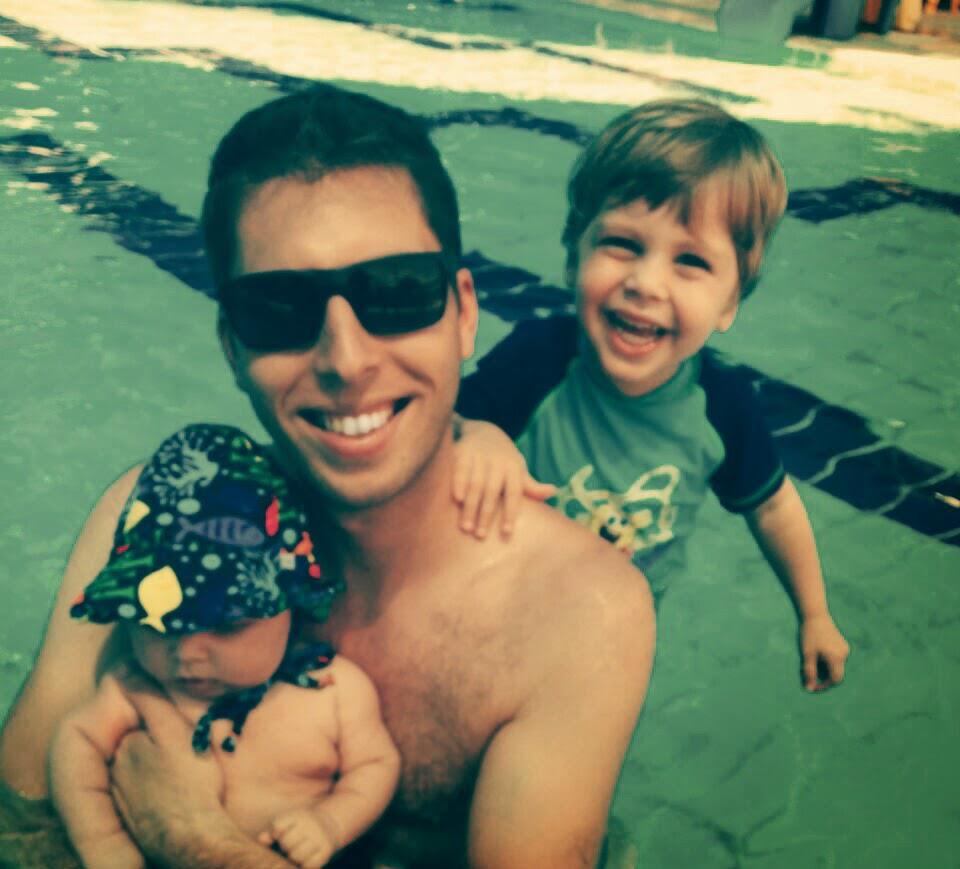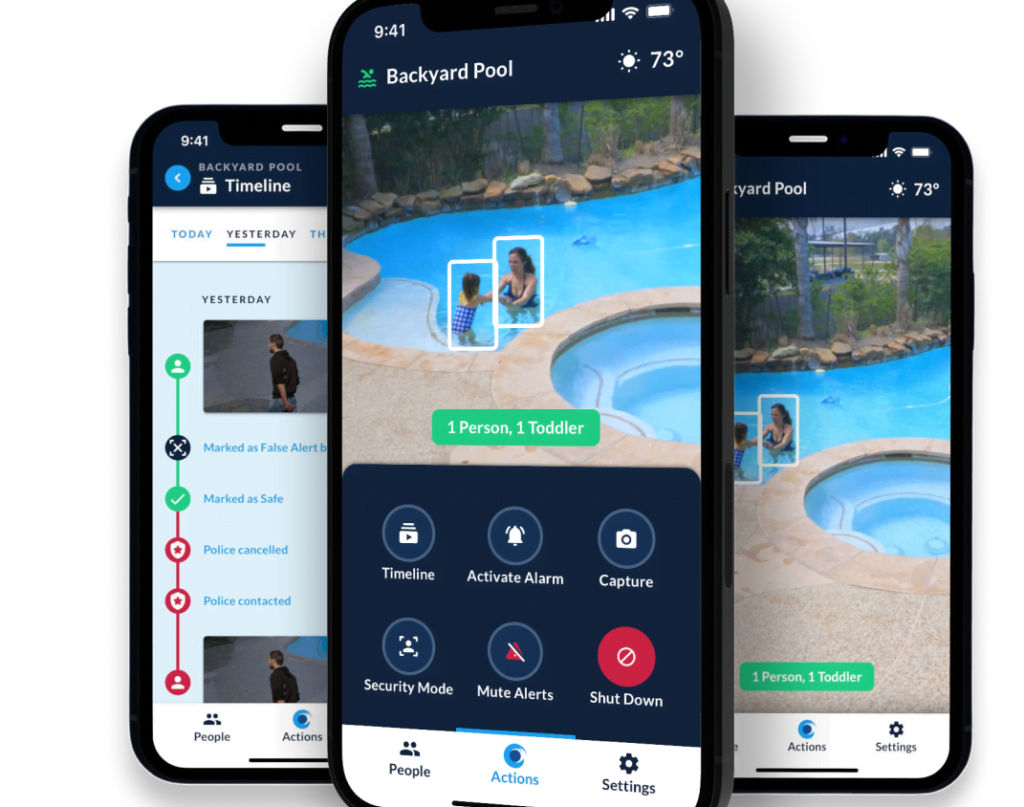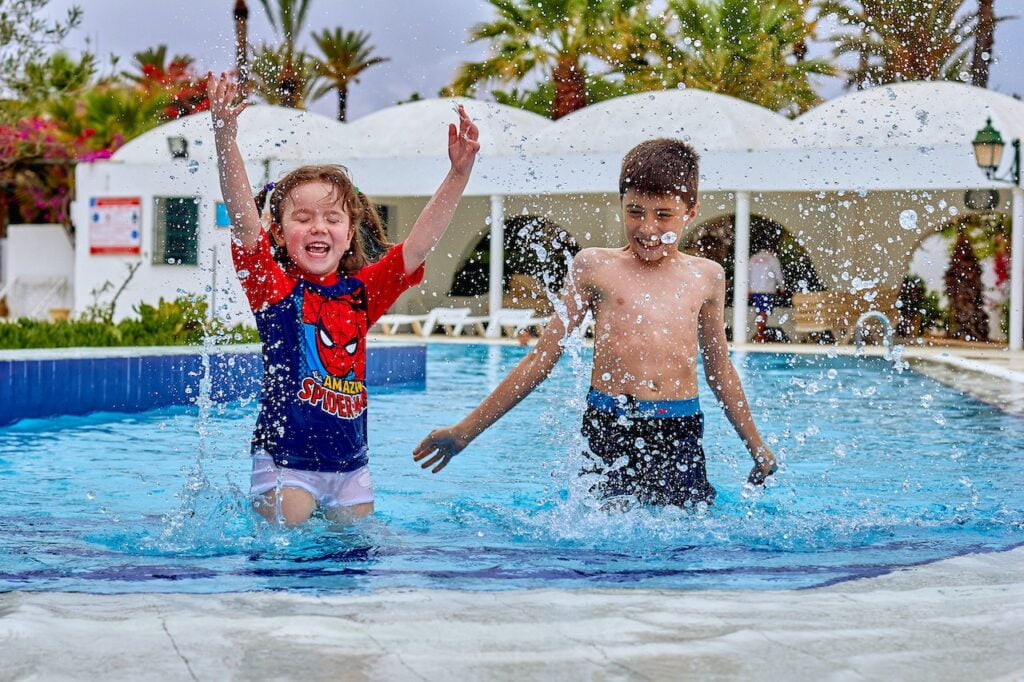It is every parent’s nightmare – sudden silence poolside, when just seconds earlier there were happy splashing and laughing voices.
That terrible scenario happened to PoolScout founder Sam Weitzman, whose young son nearly drowned in a pool in Tel Aviv in 2017. It was an incident that inspired him to create the AI safety device that alerts parents to potential dangers poolside.
Sam had just taken a photo with his two young sons and had got out of the pool to hand his youngest to his wife when he realized that his elder boy, then aged four, was missing.
“I looked over and saw him at the bottom of the pool squirming, trying to get up, and it was a pretty shaky situation. And that’s what really triggered the evolution of PoolScout,” Weitzman tells NoCamels.

Weitzman, who was then working as an investment banker at Citibank, realized that artificial intelligence – specifically deep learning technology – could be harnessed to drastically reduce the response time to such incidents.
“I wanted to make sure that we designed a solution which was going to be able to be deployed not for state level security but for the end consumer,” he says.
According to the World Health Organization, drowning is the third most common cause of unintentional injury death in the world, accounting for 7 percent of all injury-related deaths.
Around 236,000 people drown every year across the globe. The WHO says the highest drowning rates are among children aged 1 to 4 years followed by children aged 5 to 9 years.
Israel, Weitzman says, was one of the pioneers in using deep learning for security applications. He was working with clients who were involved in security projects, including how to use AI to identify someone with an assault rifle, and came to the conclusion that the same tech that can recognize someone carrying an AK-47 could be used to minimize child drownings.

The PoolScout system is designed to cater to those with any body of water in their yard, even a paddling pool. Pool owners, Weitzman says, just want to make sure that they have done everything they can to maximize safety measures, for their own peace of mind.
“We designed the solution from the ground up as something that should be very attainable, and something that really could be and should be in every pool,” Weitzman tells NoCamels.
PoolScout uses cloud-based, real-time advanced deep learning, which Weitzman says allows the system to understand specific dangerous scenarios that happen in and around a pool.
The platform operates via a WiFi network, connecting security cameras to the AI software and an app on the user’s smartphone. The cameras monitor the pool area, the footage is analyzed by the algorithm and the app emits alerts should one of those dangerous scenarios arise.
Sign up for our free weekly newsletter
SubscribePoolScout has several security functions. The first, called “Unattended Toddler,” can detect a young child heading unattended towards the pool. This feature can also differentiate between children and adults, so that the alert is not triggered every time an adult approaches the water.

The system also has a “Person Underwater” alert, which sounds when someone is underwater for more than 10 seconds, as well as a “Pet in Pool” feature that notifies the user when an animal enters the water.
“The whole app and experience is really built in a way to maximize peace of mind,” Weitzman says.
While there are other companies offering drowning prevention systems, such as SwamCam in the US and Israel’s Coral Smart Pool, Weitzman says that they are less sophisticated and more expensive than PoolScout’s cloud-based AI model, which he claims is “always learning and always improving.”
The company has bootstrapped its funding so far, but Weitzman says they are now looking for investors and planning to expand beyond pool spaces, such as into daycare, where children play outside unattended or where the ratio of adults to children is below regulatory standards.
Most of the PoolScout staff, in particular in R&D, are based in Tel Aviv, but the company also has headquarters in the US, where the system is currently on sale.
It is also available in Mexico and Canada, and the company has signed distribution agreements for several Arab states, including Oman, Egypt and the UAE.

In Israel, the system is currently involved in a pilot of some 1,000 homes, and the company is in talks with a distributor. It is also available through online sellers, in both the basic and premium editions.
For now, the system is designed for private homes, with plans to expand to commercial sites such as gyms in the coming year.
The company says it has won a number of US tech trade awards, including Best Smart Home Product, Best Smart Home Solution and Best New Product.
It takes just 20 seconds to drown, Weitzman points out, recalling his meetings with parents who have lost children in such “absolutely heart-wrenching” circumstances.
“It’s a problem that we can and are solving,” he says. “I’d be very, very happy to see the number one cause of accidental death for children not to be drowning, because that’s something that we can address.”
Related posts

Editors’ & Readers’ Choice: 10 Favorite NoCamels Articles

Forward Facing: What Does The Future Hold For Israeli High-Tech?

Impact Innovation: Israeli Startups That Could Shape Our Future




Facebook comments